A brand-new report from Pew Research study makes an attempt to much better comprehend U.S. adults who get their news mainly from social networks platforms, and compare their understanding of existing occasions and political knowledge to those who utilize other sources, like TV, radio and news publications. The top-level finding, according to Bench, is that social networks news customers tend to follow the news less closely and end up less notified on several essential topics.
That seems to strengthen a belief that many individuals currently hold, of course– that individuals who get their news mostly from Facebook, for example, aren’t as informed.
However it is essential to understand how Bench Research pertained to this conclusion and dispute to what degree it implies the platforms are at fault, which is unclear from this data.
The firm first asked people how they most commonly get their news.
About one-in-five (18%) said they mostly utilize social media to remain present. That’s close the portions of those who say they utilize regional TELEVISION (16%) or cable television (16%) news, however fewer than those who state they go straight to a news site or app (25%). Another 13%said they use network TV and only 3%stated they checked out a newspaper.
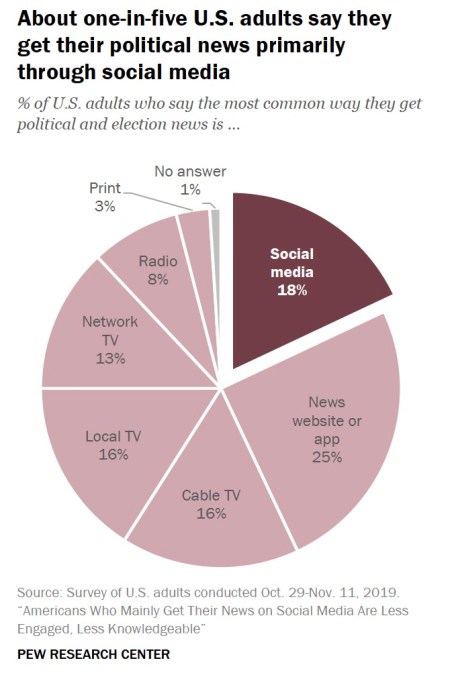
Image Credits: Bench Research
To be clear, any research study that asks users to self-report how they do something isn’t going to be as useful as those that gather difficult information on what the customers in fact do. Simply put, people who think they’re getting most of their news from TELEVISION might be, in reality, undercounting the time they spent on social media– or vice versa.
That said, among this group of “mostly” social networks news consumers, just 8%stated they were following the essential newspaper article of the 2020 U.S. election “really carefully,” compared to 37%of cable TV viewers who stated the same, or the 33%of print users who also stated this. The social networks group, on this topic, was more detailed to the regional TV group (11%).
On the topic of the coronavirus outbreak, only around a quarter (23%) of the primarily social networks news customers said they were following news of COVID-19 “really carefully.” All other groups once again reported a greater percentage, consisting of those who mostly used cable TV (50%), national network TV (50%), news sites and apps (44%) and regional TELEVISION (32%) for news.
Related to this finding, the survey participants were likewise asked 29 different fact-based concerns about news topics from current days, including those on Trump’s impeachment, the COVID-19 break out and others. Those who scored the most affordable on these topics were the consumers who said they primarily utilized social media to get their news.
Throughout nine questions related to foundational political understanding, only 17%of primarily social media news consumers scored “high political knowledge,” indicating they got 8 to 9 of the concerns right; 27%scored “middle political understanding” (six-seven right) and 57%scored “low political understanding” (five or fewer right.) The only group that did worse were those who mostly depend on local TV.
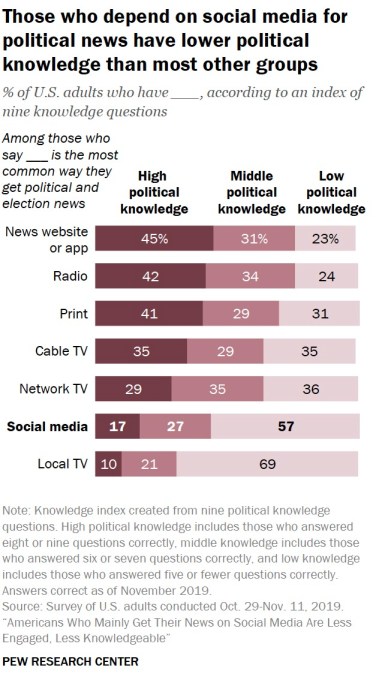
Image Credits: Bench Research
Also, 45%of those who got their news mainly through sites and apps, on the other hand, had “high political understanding,” compared to 42%for radio, 41%for print, 35%for cable TV and 29%for network TV.
The social media group of news consumers was likewise more exposed to fringe conspiracies, like the concept that the pandemic was purposefully planned. This was significantly higher than all other news platforms, and an indication of how much conspiracies can spread across social media.
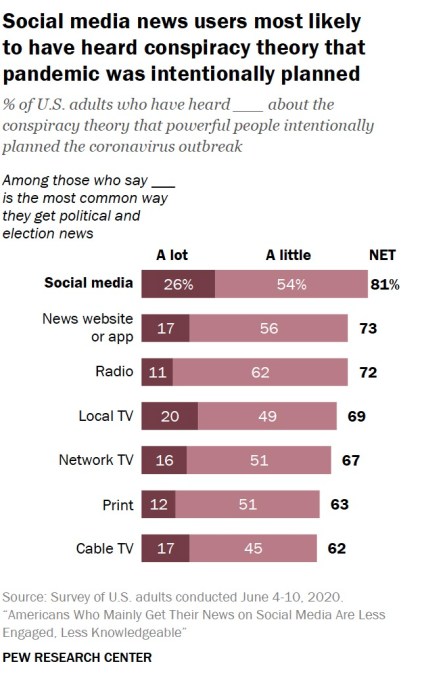
Image Credits: Pew Research
And yet, the exact same social media group reported they’re less concerned about the impact of made-up news. Only around four-in-ten (37%) stated they were “very worried” about the effect of fabricated news on the 2020 elections, for instance, which was lower than every other group except for regional TELEVISION audiences (35%). Cable TV viewers had the most concern, at 58%.
More concerning, possibly, is the power these conspiracies have to sway minds. Amongst those social networks news consumers familiar with the COVID-19 conspiracy, 44%who utilized social networks to frequently get COVID-19 news stated the theory was at least “probably true.” Only 33%of those who relied less on social networks for COVID-19 news stated the very same.
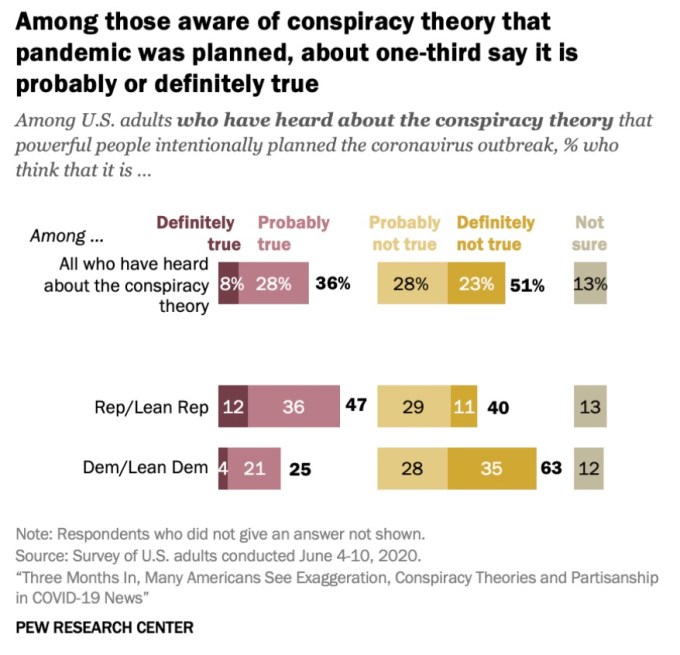
Image Credits: Seat Research Study
The research study went on to compare social media news consumers’ understanding of other topics, like COVID-19 impacts and related health news, with those who got their news from other sources, using comparable techniques. Again, the social networks group came away with the least well-informed.
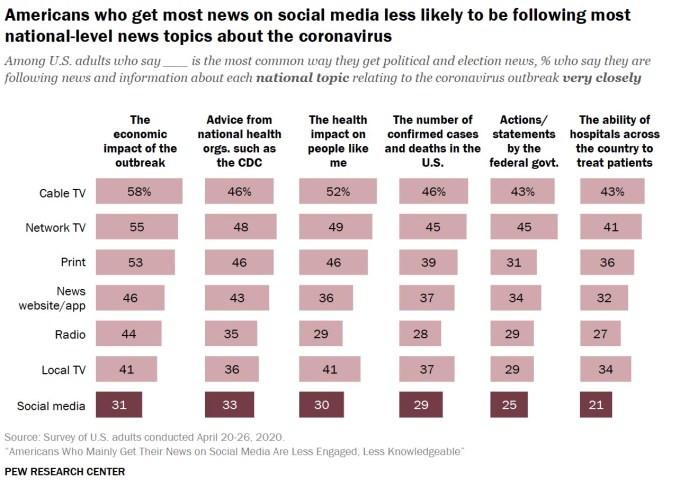
Image Credits: Bench Research Study
Pew’s conclusion from its research is that social networks users are less informed, which seems relatively precise on these particular topics. However the implication– or at least, what some individuals might take away from this report– is that they’re less notified because they rely on social media as their main news source. That’s not always real, provided this data.
The firm’s research likewise found that social media news consumers manipulated young– 48%of those who primarily used social media for news were in between 18 and29 They likewise tended to have lower levels of formal education, as only 26%had a college degree, versus 47%of those who read news websites or the 49%who turn to print.
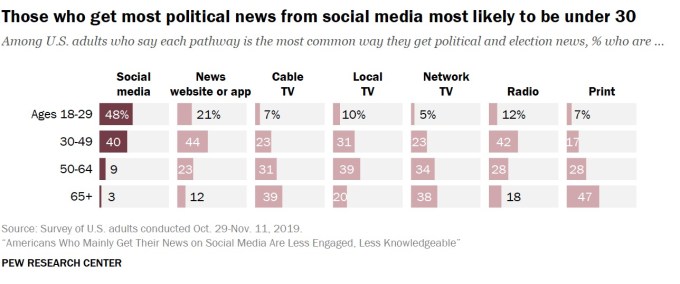
Image Credits: Seat Research Study
Historically, we understand young individuals do not engage with politics at the exact same level as older adults. They can be less engaged in their local politics due to the fact that they’re transferring for college or for new jobs, due to the fact that they haven’t made voting a habit and typically miss registration due dates.
On other topics, youths might also feel similarly distanced and disengaged. Numerous young adults have been unconcerned by the coronavirus break out, for instance, believing it just impacts older people, and continuing as normal.
Their lack of knowledge, then, about the news might be due not to the platform where it’s consumed, however their interest and engagement with the topics in general.
TechCrunch.


